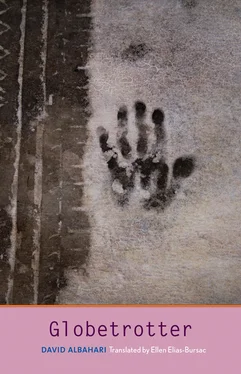At the door, however, when I opened it, Daniel Atijas was not the person standing there, so I needed a few moments to collect myself and exchange his facial features, already drawn in my mind, for the features of the person who was there, Mark Robinson. Troubles never come singly, of course. It was not enough that Daniel Atijas was fading away toward the horizon; now Mark had to be standing in front of me, obstructing my view. I rose up on my tiptoes and peered over his shoulder. There was nothing to be seen, not even an elk on the path. I am on my way out the door, I said to Mark, to check in at the Banff Centre office and see whether the canvas I ordered from Calgary has come, and without waiting for him to say a word I slammed the door of the studio and set out on the path strewn with pine needles. Mark plodded along after me, rumbling about a literary gathering later that evening, at which, or so he’d heard, Daniel Atijas, too, was supposed to be reading. He didn’t know what. Nor did I. Had I not already been stung by Daniel Atijas’s imminent departure, the fact that he hadn’t mentioned the gathering would have pained me even more, so ultimately, in an odd way, I could be gratified, but I still had to press my left fist to my chest, to the spot under which beat my heart, pounding as it never had before, while behind me, ambling along like a bear, was Mark Robinson, uttering unfamiliar words and meddling with the silence.
Isn’t that just the way it always is, I thought, that whenever I want to be alone, there is someone standing behind me, even when nobody’s there at all. I think it was then, on the path near the little wooden bridge and the musicians’ huts, that I first pushed to convince myself to give up, not because of feeling stung or powerless — both things were definitely familiar to me from before, particularly the powerlessness with which I had been living ever since I’d begun painting — but because of feeling tugged by forces that were drawing me into something I had never experienced, a vortex of historical events and interpretations from which, I sensed, I might never wrench free. Living in North America, I thought as I stood in the Centre office with Mark Robinson breathing down my neck, I had begun to believe that history happened to others, that here in Canada we were already living in the future, or at least in a present that had had no past for a very long time. When I later tried to articulate these thoughts — more concisely, of course — to Daniel Atijas before the literary gathering, he made the point that this sense of time was due not merely to geographic coordinates and the specifics of one place or another; there was, he said, a similar readiness to give up on history in all economically advanced countries. History, said Daniel Atijas, is terrible ballast, and those who can, give history a wide berth, which is easiest to do in countries where the standard of living and ownership allow you a false conviction that history is over and done with — unnecessary, piddling, superfluous, and used up, like old sandpaper.
Everything that was sharp is now blunted, he said, and does nobody any good. And therein, he went on, lies the greatest rub, for history can never be completely blunted. Even when it grows dull, it goes right on slicing and dicing the same as ever, which here, he said, can best be seen in the example of Quebec, where blunt history, when needed, can become the most lethal of weapons. This is a paradox worth thinking about, he said, but apparently, he said, as we waited for the literary gathering to begin, nobody is, just as nobody, he added, seems to be thinking about how history is allowed to exist on this continent in several versions at the same time, not only in the one penned by the victor but in the version by the defeated and by the many groups from the social or sexual or religious margins, and all these histories are embraced as valid, creating additional turmoil in the mind of every poor soul who, nevertheless, is prepared — despite being assailed by tales of the demise of history — to take history as a given, necessary and with benefits for mental health. I was surprised that he was speaking of a connection between history and mental health, for based on things he had said earlier, and especially in the first talk he gave on June 10, I had had an entirely different impression of his view of history, and he struck me as the type who does not easily switch views, especially not ones grounded in personal experience; but this would not be the first time that mountains swayed a person so that the person, especially someone from the plains, lost all sense of direction, both on the outside, their geographic sense, and on the inside, in the sense of heart and mind.
But just as I was about to ask him about this, over came the director of the Literary Arts Programs and his wife. It’s time, said the director, and we followed him dutifully. First a poet from Chile read, then a playwright from Toronto, then Mark Robinson, and then a poet from Vancouver, a Chinese woman. I could have left at that point, for I found it so tedious listening to all these poems about little moments that meant nothing, probably not even to the poets, not to anybody. After that there was a fifteen-minute break that I spent loudly sipping coffee in a corner of the foyer, though not too loudly, just loudly enough so that Daniel Atijas, standing in the facing corner, surrounded by women, could hear me.
A coffee sip, I remember thinking, is like a snake hiss, though I was startled as soon as I thought it by my readiness to liken myself to a viper. I would have loved to hear what Daniel Atijas had to say about that, but the women were tenacious, unrelenting, and only the director of the Literary Arts Programs managed to wrest him free, though Daniel Atijas had to promise he’d be back once the readings were done. Daniel Atijas was first to perform in the second half, and again his voice quavered as he reined in his emotions, though this time he was reading a story instead of an essay on the fate of his country: former country, as Daniel Atijas always added. The story he read — which he announced was brand-new, only recently translated into English — this story spoke of nothing. There was no storyline to it, no events, no central or marginal characters; it seemed to have no beginning or end. It was all about passage, about language itself — endlessly beautiful and powerful — and if it sounded this good in translation, I had to wonder what it had sounded like in the original.
I doubt anyone but I was interested, because when I turned around, I didn’t see a single radiant face, and the president of the Banff Centre did nothing to stifle his yawns. For me the evening ended when Daniel Atijas’s story came to an end, but I stayed on to hear the other participants, an essayist from Winnipeg, a novelist from Mexico, and a poet from Calgary, though I didn’t really hear them, for I was still hearkening, though now only within myself, to his story’s cadence. After lukewarm applause that marked the end of the reading, the director of the Literary Arts Programs invited everyone to have coffee and dessert and to mingle with the authors, who, said the director, had shown us once again that without words there would be no world, or that the world is words, regardless of the language in which they are spoken or written. All that was left to ascertain, added the director, was whether in their world there was room for confections, which, as everybody knows, are spun not of words but of sugar and chocolate. He chuckled as if he had said something witty. The people in the audience stood up, chatter filled the hall, several women, perhaps the same ones, flocked again to Daniel Atijas, and I tried to find a spot right behind Mark Robinson, checking out as I did so the angles with which to gauge the precise angle of my invisibility, and bumped into the poet from Vancouver. A plastic glass wobbled in her hand, but nothing spilled, and even if it had, said the poet, she was holding ordinary tap water. She never drank anything else, least of all carbonated beverages, which are often dyed with chemical substances and can leave nasty stains for which there is almost no remedy, whereas tap water leaves no stains at all, regardless of the kind of fabric.
Читать дальше







![David Jagusson - Fesselspiele mit Meister David [Hardcore BDSM]](/books/486693/david-jagusson-fesselspiele-mit-meister-david-har-thumb.webp)




